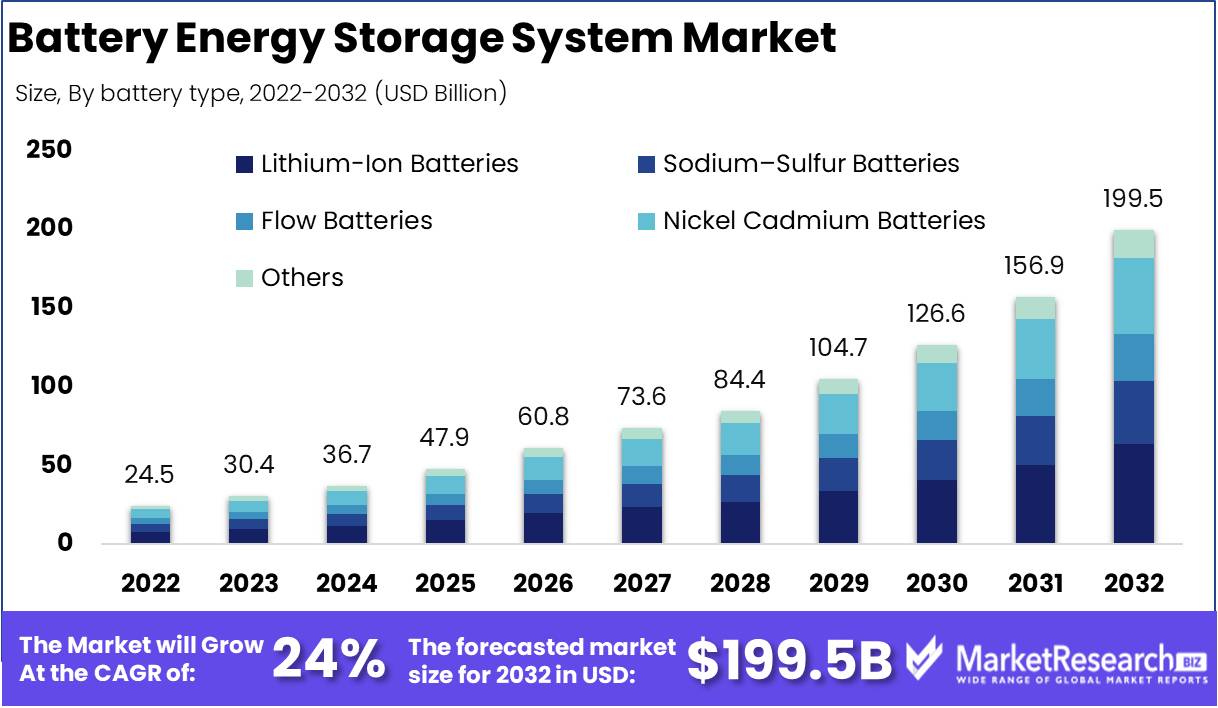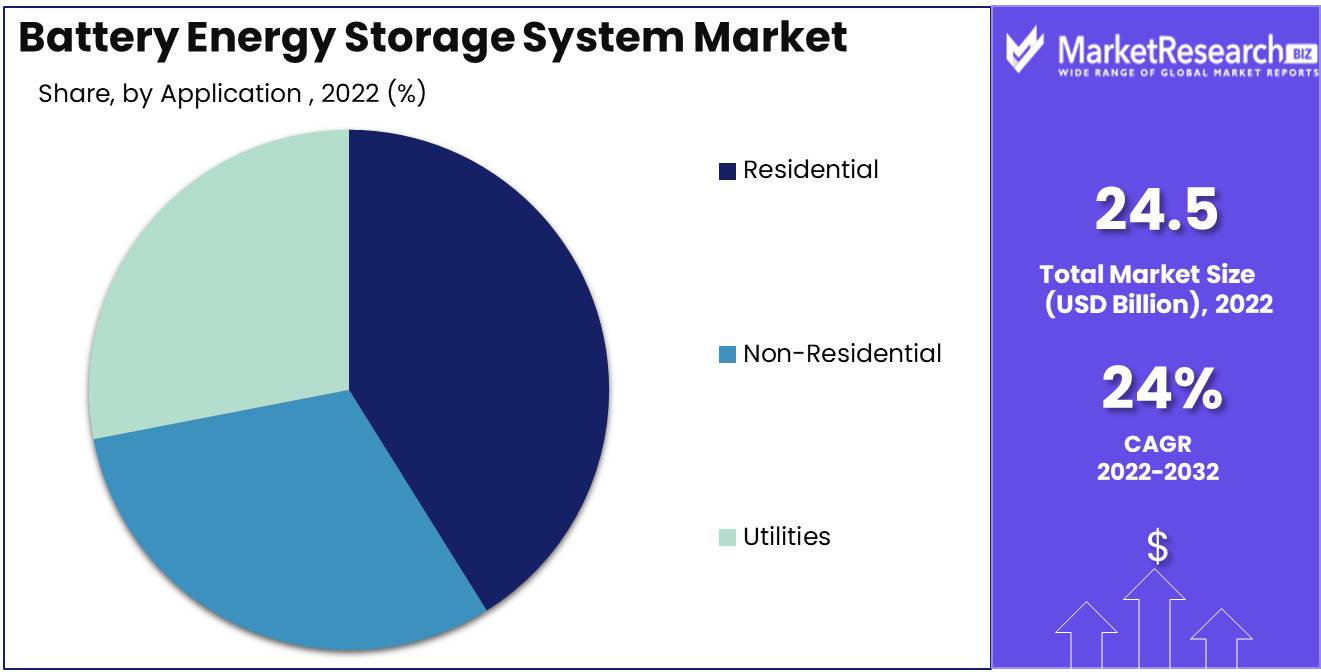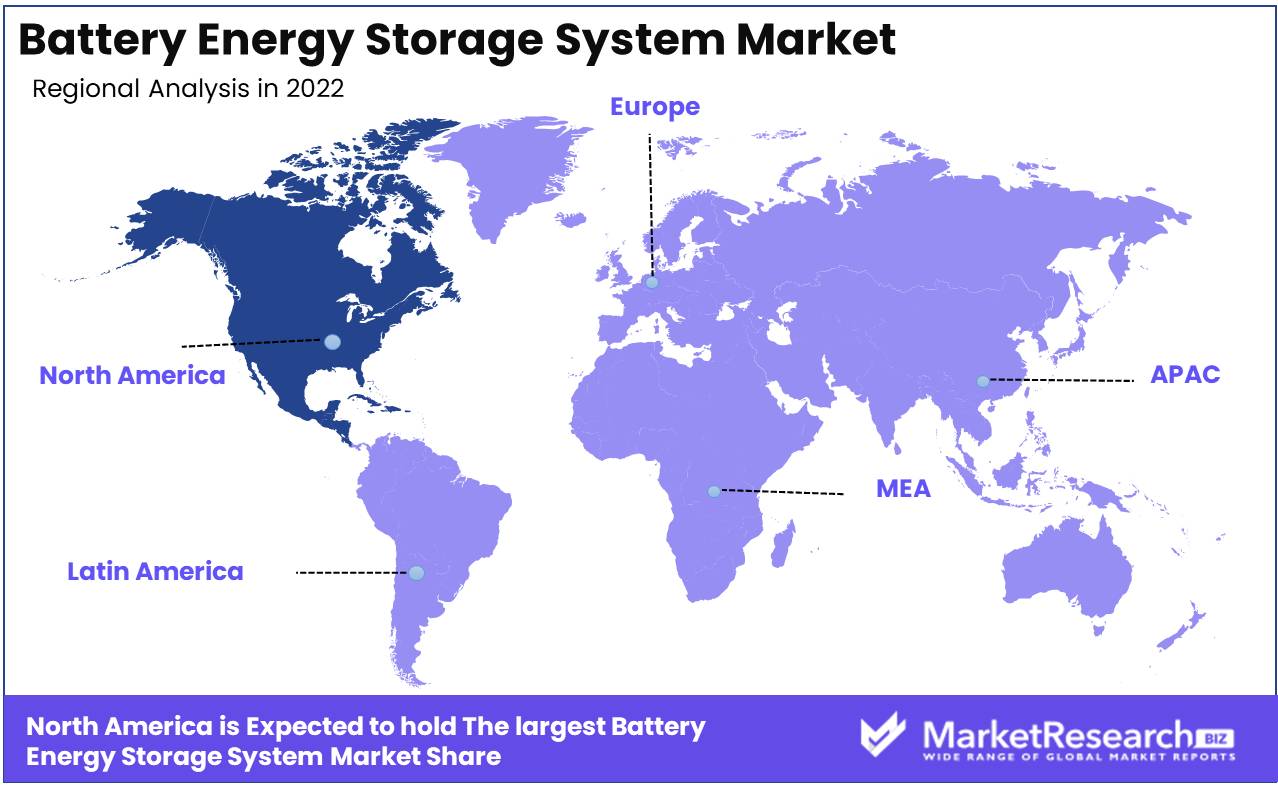
Battery Energy Storage System Market By battery type (Lithium-Ion Batteries, Sodium–Sulfur Batteries, Flow Batteries, Others), By connection type (On-Grid Connection, Off-Grid Connection), By application (Residential, Non-Residential, Utilities), By Region And Companies - Industry Segment Outlook, Market Assessment, Competition Scenario, Trends, And Forecast 2023-2032
-
6800
-
Jul 2023
-
155
-
-
This report was compiled by Correspondence Linkedin | Detailed Market research Methodology Our methodology involves a mix of primary research, including interviews with leading mental health experts, and secondary research from reputable medical journals and databases. View Detailed Methodology Page
-
Report Overview
Battery Energy Storage System Market size is expected to be worth around USD 199.5 Bn by 2032 from USD 24.5 Bn in 2022, growing at a CAGR of 24% during the forecast period from 2023 to 2032.
The Battery Energy Storage System Market has expanded exponentially over the past few years and shows no indications of slowing down in the near future. Battery Energy Storage Systems (BESS) is an innovative technology that stores energy for later use from a variety of sources, such as solar power, wind power, and electric utilities. The BESS Market consists of various battery varieties, including Lithium-ion, Sodium-ion, Lead-acid, and Redox-flow, among others.

The significance of BESS cannot be exaggerated, particularly as the global energy demand continues to rise. This innovative technology contributes to the reduction of energy waste, the enhancement of energy efficiency, and the improvement of energy management. It also plays a crucial role in increasing grid stability and energy supply dependability. BESS systems provide numerous benefits, such as increased integration of renewable energy, peak reduction, load shifting, ancillary services, and reduced energy costs.
In recent years, the BESS market has witnessed numerous noteworthy innovations, such as new battery chemistries, enhanced battery management systems, and more efficient energy storage and retrieval techniques. One such innovation is the Tesla Powerwall, which provides reserve power during blackouts, maximizes the use of solar-generated energy, and enables homeowners to transfer excess electricity back to the grid.
Integrating ethical and responsible practices is essential for the implementation of BESS. Concerns regarding the ethics of BESS include the dispersal of hazardous refuse, the depletion of resources, and the impact on human health and the environment. In the design, manufacture, and disposal of batteries, responsible practices necessitate openness, explicability, and accountability. To address these concerns, industry standards, certifications, and regulations regarding the disposal and recycling of batteries have been implemented. In the battery energy storage system market, V2G technology is enabling EVs to serve as mobile power banks, optimizing grid stability.
Driving factors
Renewable energy expansion ignites expansion.
The Battery Energy Storage System Market is at the epicenter of a renewable energy revolution in the era of environmental awareness. The market is poised for significant expansion on the back of a surge in demand for renewable energy sources. As the world grapples with the effects of climate change, the need for robust energy storage systems becomes of the utmost importance. Renewable energy sources, such as wind and solar, contain enormous potential, and the market is prepared to exploit it.
Intelligent Grid Integration
The Battery Energy Storage System Market embraces the integration of smart grid infrastructure, unleashing the innovation symphony. This revolutionary union unleashes a succession of benefits, augmenting the overall efficacy of power delivery and lowering the cost of electricity. By integrating Energy Management Systems seamlessly into smart infrastructures, the market harnesses the power of intelligence and effectiveness. Observe the technological ballet as the market advances toward a future of sustainable energy management.
Enhanced Market Momentum
The explosive growth of electric vehicles (EVs) functions as a driving force for the Battery Energy Storage System Market. EVs represent a paradigm shift in the automotive landscape, and the market has responded enthusiastically. Battery energy storage systems play a crucial role in administering the charging infrastructure for EVs, ensuring the charging stations have a consistent power supply. The symbiotic relationship between electric vehicles and battery energy storage systems propels the market forward and simultaneously revolutionizes transportation and energy storage.
Enhancing Dependability
The Battery Energy Storage System Market arises as a beacon of dependability in an era beset by power outages. Battery energy storage systems step up to the challenge when uninterrupted power supply becomes a top priority. By providing backup power during system malfunctions or disruptions, these systems guarantee a continuous energy supply. Embrace the assurance of a continuous power supply and observe the market's role in promoting stability and resiliency.
Regulations and Customer Awareness
The Battery Energy Storage System Market is in flux due to the influence of two significant forces. First, governments around the world advocate for energy storage via regulatory incentives and policies. Any modifications to these regulations send shockwaves through the market, determining its fate. As awareness of energy conservation and sustainable living increases, a second paradigm shift in consumer behavior emerges. Consumers are actively seeking ways to reduce their energy consumption, and battery energy storage systems provide an effective solution. Examine the dynamic relationship between regulations and consumer awareness as they transform the market landscape.
Restraining Factors
Increasing Demand for Organic and Natural Products
There is a growing trend towards organic and natural products, including cooking oils. Consumers are seeking healthier alternatives without chemical additives or pesticides. Avocado oil market, with its natural extraction process and nutritional benefits, aligns with this trend and is witnessing increased demand.
Rising Popularity of Vegan and Plant-Based Diets
The growing adoption of vegan and plant-based diets is driving the demand for cooking oils derived from plant sources. Avocado oil market, being a plant-based product, is gaining traction among individuals following such diets, as it provides a suitable replacement for animal-derived fats.
Focus on Sustainability and Ethical Sourcing
Consumers are increasingly conscious of sustainability and ethical practices. Avocado oil market companies are emphasizing sustainable sourcing methods, including responsible farming practices, fair trade certifications, and eco-friendly packaging. This trend resonates with environmentally conscious consumers and positively influences their purchasing decisions.
Innovative Packaging Solutions
Avocado oil manufacturers are exploring innovative packaging solutions to enhance convenience, product freshness, and shelf appeal. This includes the use of dark-tinted glass bottles to protect the oil from light exposure, easy-to-use pour spouts, and packaging materials made from recyclable or biodegradable materials.
Growing Demand for Premium and Specialty Oils
There is a rising demand for premium and specialty oils in the market, driven by consumers' willingness to pay for higher quality products. Avocado oil market, with its unique flavor profile, nutritional value, and health benefits, caters to this demand and is increasingly positioned as a premium cooking oil option.
Product Transparency and Traceability
Consumers are increasingly seeking transparency in the food and skincare industries. Avocado oil market companies are focusing on providing detailed information about the sourcing, production process, and quality standards of their products. By ensuring transparency and traceability, companies can build trust and credibility with consumers.
Battery Type Analysis
The Lithium-Ion Batteries segment dominates the battery energy storage system market. This is due to the high energy density, longer cycle life, and low maintenance requirements of Lithium-Ion batteries.
Consumers are opting for Lithium-Ion batteries due to their high energy density and longer cycle life. These batteries are also preferred for their low maintenance requirements, which make them ideal for use in remote and off-grid locations. The Lithium-Ion Batteries segment is anticipated to register the fastest growth rate over the forthcoming years. The high demand for Lithium-Ion batteries for electric vehicles and renewable energy storage applications is expected to drive the growth of this segment.
Connection Type Analysis
The On-grid Segment dominates the battery energy storage system market due to its suitability for large-scale energy storage applications. Consumers are opting for On-grid solutions due to their high power output, reliability, and fast response times. These solutions are also preferred for large-scale energy storage applications such as grid stabilization and peak shaving.
The On-grid Segment is predicted to register the fastest growth rate over the forthcoming years. The increasing demand for large-scale energy storage solutions for grid stabilization and peak shaving is expected to drive the growth of this segment.
Application Analysis
The Residential Segment dominates the battery energy storage system market due to the increasing demand for energy storage solutions for residential applications. Consumers are opting for Residential solutions due to their high energy security and backup power in the event of a blackout. These solutions are also preferred for their suitability for residential applications such as solar power backup.
The Residential Segment is anticipated to register the fastest growth rate over the forthcoming years. The increasing demand for energy storage solutions for residential applications is expected to drive the growth of this segment.

Key Market Segments
By battery type
- Lithium-Ion Batteries
- Sodium–Sulfur Batteries
- Flow Batteries
- Nickel Cadmium Batteries
- Others
By connection type
- On-Grid Connection
- Off-Grid Connection
By application
- Residential
- Non-Residential
- Utilities
Growth Opportunity
Renewable Energy Systems with Energy Storage
The symbiotic integration of energy storage systems with renewable energy sources acts as a catalyst to advance the Battery Energy Storage System Market (BESS). These systems serve as the missing element of the puzzle, mitigating the intermittent nature of renewables and assuring a steady power supply when it is required. As solar PV and wind power experience exponential growth, BESS demand skyrockets, reinforcing its central role in the energy transition.
Innovative Battery Chemistry
The introduction of novel battery chemistries marks a turning point in the BESS market. Despite the current dominance of lithium-ion batteries, the emergence of promising alternatives is expected to transform the industry. With higher energy densities, improved safety features, and longer lifespans, battery technologies such as lithium-sulfur and solid-state batteries are poised to challenge the dominance of lithium-ion.
Grid-Scale Energy Storage Systems
The BESS market undergoes a paradigm transition due to the growing demand for grid-scale energy storage systems. These systems provide utilities with a crucial instrument for managing peak demand, assuring grid stability while decreasing reliance on fossil fuel generation. End-users acquire the ability to optimize their energy consumption by charging during off-peak hours and discharging during periods of high demand, thereby effectively reducing energy costs and fostering sustainability.
Providing Assistance in Remote Areas
In remote areas lacking dependable utility infrastructure, the BESS market thrives. Here, energy storage replaces diesel generators and fossil fuel-based generation as a beacon of hope. BESS solutions provide these remote regions with dependable and cost-effective alternatives, allowing them to utilize renewable energy sources while decreasing their reliance on nonrenewable resources.
Intelligent Energy Management Systems
In the BESS market, the development of intelligent energy management systems heralds in a new era of efficiency and optimization. These systems transform BESS performance by dynamically prioritizing applications based on energy prices and demand. End-users benefit from analytics and reporting capabilities, which enable them to optimize energy consumption practices and increase the efficacy of BESS solutions.
Latest Trends
Domestic and Business Applications
The residential and commercial sectors are rapidly adopting battery energy storage systems (BESS). The integration of BESS with renewable energy sources accelerates their adoption, allowing for effective energy storage and grid balancing. Residential and commercial structures maximize energy efficiency and contribute to a sustainable future by decreasing their reliance on conventional power sources.
Systems Combining Renewable Energies
Combining multiple sources such as solar, wind, and hydro with BESS, hybrid renewable energy systems are revolutionizing the energy landscape. These systems improve energy efficiency, reduce reliance on conventional power infrastructures, and reduce carbon footprints significantly. As demand for sustainable energy solutions increases, the BESS market is undergoing a transition.
Virtual Energy Generators
Virtual power plants (VPPs) emerge on the BESS market as a game-changing trend. VPPs facilitate dynamic energy management and cost-effective utilization of BESS by seamlessly integrating small-scale energy storage systems into interconnected networks. VPP capabilities are strengthened by innovations in blockchain and the Internet of Things (IoT), paving the way for a more efficient and adaptable energy landscape.
Applications for used batteries
Unlocking the potential of second-life battery applications drives the BESS market forward. These batteries, which have a diminished storage capacity, find use in less critical applications, such as charging stations for electric vehicles, residential and commercial energy storage, and off-grid systems. By reusing used batteries, the market embraces sustainability and cost-effectiveness, thereby accelerating the adoption of BESS.
Conservation and Recycling
Sustainability and recycling occupy center stage as the BESS market expands. The environmental impact of battery detritus is recognized by battery manufacturers and stakeholders, who prioritize recycling efforts. By encouraging responsible waste management and sustainable resource utilization, the market embraces circular economy principles and ensures the long-term viability of energy storage systems.
Regional Analysis
In both the United States and Canada, the prevalence of energy storage systems has increased significantly. This growth is in part driven by the need to reduce reliance on conventional fossil fuel-based power generation and the desire to increase grid resilience and reliability. This article will investigate the factors influencing the adoption of energy storage systems in the United States and Canada.
The United States is home to the world's largest energy storage market, with deployment increasing by nearly 40% in 2020 alone. The vast majority of energy storage deployed in the United States consists of lithium-ion batteries, with both residential and utility-scale installations experiencing substantial growth. California is the leader in energy storage deployment in the United States, with ambitious goals to install 1 GW of storage by 2023 and 3 GW by 2030.
Improving grid resilience and dependability is one of the primary motivations for energy storage adoption in the U.S. As the frequency of extreme weather events rises, the ability to store and deploy energy during outages and brownouts becomes increasingly crucial. In addition, states such as California are utilizing energy storage to reduce their reliance on conventional fossil fuel-based power generation, with the aim of achieving carbon-neutral or carbon-negative status within the next few decades.
Although Canada's energy storage market is lesser than that of the United States, it has experienced rapid expansion in recent years. The majority of energy storage in Canada consists of pumped hydrostorage, though the use of lithium-ion batteries is growing. Ontario is the leader in energy storage deployment, with ambitious goals to install 50 MW of energy storage by 2025.

Key Regions and Countries
North America
- US
- Canada
- Mexico
Western Europe
- Germany
- France
- The UK
- Spain
- Italy
- Portugal
- Ireland
- Austria
- Switzerland
- Benelux
- Nordic
- Rest of Western Europe
Eastern Europe
- Russia
- Poland
- The Czech Republic
- Greece
- Rest of Eastern Europe
APAC
- China
- Japan
- South Korea
- India
- Australia & New Zealand
- Indonesia
- Malaysia
- Philippines
- Singapore
- Thailand
- Vietnam
- Rest of APAC
Latin America
- Brazil
- Colombia
- Chile
- Argentina
- Costa Rica
- Rest of Latin America
Middle East & Africa
- Algeria
- Egypt
- Israel
- Kuwait
- Nigeria
- Saudi Arabia
- South Africa
- Turkey
- United Arab Emirates
- Rest of MEA
Key Players Analysis
As they facilitate the integration of renewable energy sources and the efficient management of grid fluctuations, battery energy storage systems (BESS) play an increasingly vital role in the global energy market. Companies that provide a variety of energy storage solutions, including residential, commercial, and utility-scale systems, dominate the BESS market.
Tesla is one of the foremost companies in the BESS market. Tesla is well-known for its electric vehicle technology, but with its Powerwall and Powerpack products, the company has also been a pioneer in the energy storage market. In addition to residential and commercial applications, Tesla's BESS systems are designed for utility-scale initiatives.
LG Chem is a notable competitor in the BESS market. LG Chem is a South Korean corporation that manufactures a variety of lithium-ion batteries used in electric vehicles and energy storage systems. BESS solutions are employed in residential, commercial, and industrial settings.
In addition to Panasonic, Samsung SDI, NEC Energy Solutions, and BYD, Panasonic, Samsung SDI, and NEC Energy Solutions are also significant participants in the BESS market. Each of these businesses takes a different approach to BESS solutions, but they are all committed to providing dependable, efficient, and cost-effective energy storage options for a wide range of applications.
The BESS market will likely become more competitive as the demand for renewable energy sources and energy management solutions continues to rise. However, these market leaders in BESS are well-positioned to drive the industry as it adapts to new technologies and fluctuating market demands.
Top Key Players in Battery Energy Storage System Market
- ABB Limited
- LG Chem
- NEC Corporation
- Panasonic
- Samsung SDI Ltd.
- AEG Power Solutions
- General Electric
- Hitachi Chemical Co. Ltd.
- Siemens AG
- Tesla Inc.
Recent Development
In December 2021, The battery energy storage system market has witnessed numerous recent breakthroughs that might change the sector. Tesla's Megapack energy storage device, with 3 gigawatt-hours of storage, was presented. This utility-scale energy storage and distribution system might change the industry.
In September 2021, LG Energy Solution introduced a new battery with a carbon nanotube-infused cathode material. This method might boost battery longevity by 50% and make electric cars (EVs) more inexpensive and appealing.
In July 2021, the US Department of Energy announced a $120 million funding opportunity for low-cost, long-duration energy storage devices. Making renewable energy more dependable and affordable is the goal of this program.
In May 2021, the Australian Renewable Energy Agency (ARENA) invested $43 million in four new battery storage projects. These initiatives will boost grid dependability and minimize fossil fuel power generation.
In February 2021, French energy major Total acquired a 20% stake in Indian battery maker Amara Raja Batteries Limited. This initiative is part of Total's aim to dominate the energy storage market and bring new technologies to market.
Report Scope:
Report Features Description Market Value (2022) USD 24.5 Bn Forecast Revenue (2032) USD 199.5 Bn CAGR (2023-2032) 24% Base Year for Estimation 2022 Historic Period 2016-2022 Forecast Period 2023-2032 Report Coverage Revenue Forecast, Market Dynamics, COVID-19 Impact, Competitive Landscape, Recent Developments Segments Covered By battery type (Lithium-Ion Batteries, Sodium–Sulfur Batteries, Flow Batteries, Nickel Cadmium Batteries, Others)
By connection type (On-Grid Connection, Off-Grid Connection)
By application (Residential, Non-Residential, UtilitiesRegional Analysis North America – The US, Canada, & Mexico; Western Europe – Germany, France, The UK, Spain, Italy, Portugal, Ireland, Austria, Switzerland, Benelux, Nordic, & Rest of Western Europe; Eastern Europe – Russia, Poland, The Czech Republic, Greece, & Rest of Eastern Europe; APAC – China, Japan, South Korea, India, Australia & New Zealand, Indonesia, Malaysia, Philippines, Singapore, Thailand, Vietnam, & Rest of APAC; Latin America – Brazil, Colombia, Chile, Argentina, Costa Rica, & Rest of Latin America; Middle East & Africa – Algeria, Egypt, Israel, Kuwait, Nigeria, Saudi Arabia, South Africa, Turkey, United Arab Emirates, & Rest of MEA Competitive Landscape ABB Limited, LG Chem, NEC Corporation, Panasonic, Samsung SDI Ltd., AEG Power Solutions, General Electric, Hitachi Chemical Co. Ltd., Siemens AG, Tesla Inc. Customization Scope Customization for segments, region/country-level will be provided. Moreover, additional customization can be done based on the requirements. Purchase Options We have three licenses to opt for: Single User License, Multi-User License (Up to 5 Users), Corporate Use License (Unlimited User and Printable PDF) -
-
- ABB Limited
- LG Chem
- NEC Corporation
- Panasonic
- Samsung SDI Ltd.
- AEG Power Solutions
- General Electric
- Hitachi Chemical Co. Ltd.
- Siemens AG
- Tesla Inc.




